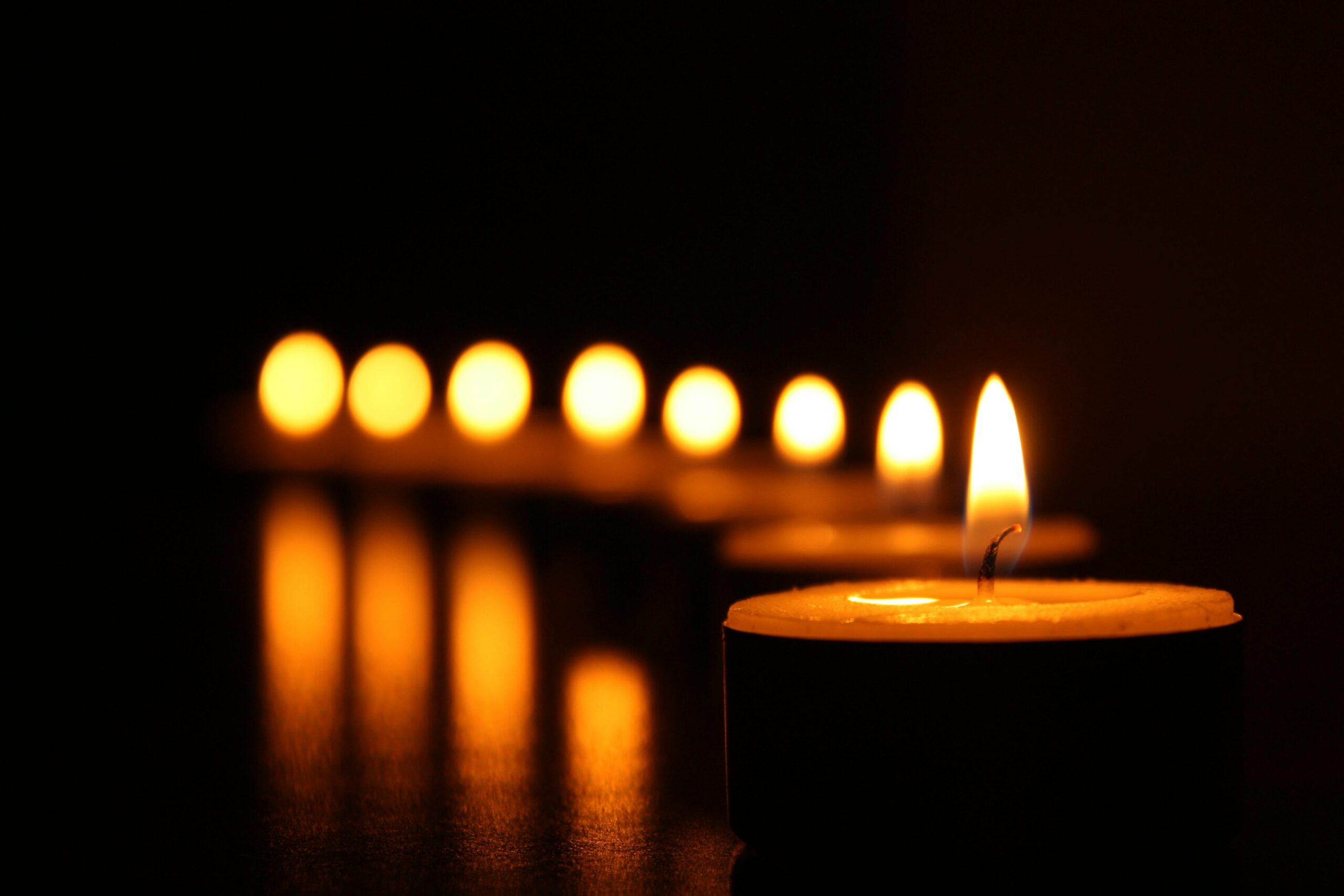I have always been partial to the Easter Vigil on Holy Saturday. Each year, my mother and I go together, and we appreciate its measured pace, especially how varied this liturgy is—from the flickering candles to the parade of Old Testament readings to the sacraments of initiation where someone’s public profession of faith re-energizes ours right at the point on the liturgical calendar when we most need it. The Easter Vigil, the longest Mass of the year during which we actively celebrate Jesus’s resurrection, is a liturgy of anxious anticipation and weighty contradictions; flame and water, faith in darkness.
Thinking on those contradictions is part of what makes the Easter Vigil and Holy Saturday so fascinating to me. And while scripture gives us a lot to think about, for me, an artistic perspective is always an important one when it comes to interpreting my faith. Enter “Easter Eve 1945.”
The Easter Vigil is a liturgy of anxious anticipation and weighty contradictions; flame and water, faith in darkness.
It wasn’t until recently that I stopped to wonder why Muriel Rukeyser, the mid-century poet and activist, famous in particular for both her bisexuality and her association with secular Judaism, took an interest in Holy Saturday—“This earth-long day / between blood and resurrection where we wait / remembering sun, seed, fire” (29-34). In addition to her mentorship of some of the most important female poets of the twentieth century (including Adrienne Rich, Anne Sexton, and Sharon Olds), Rukeyser often attached her public and poetic voices to leftist and liberal causes. Her most famous poem begins, “I lived in the first century of world wars,” and many of her other poems—with vehemence and grand-scale wonder—take apart what that means, questioning darkness, evil and what type of light will be necessary to vanquish them.
In “Easter Eve 1945,” which is reprinted below, Rukeyser stops to ponder some of these questions at a particularly grave moment during the second World War. (You can listen to the poet herself read it here.) With V-E day over a month away from March 31, 1945, when the poem is ostensibly set, Rukeyser equates this moment anticipating peace to Holy Saturday itself and channels its feeling of spiritual fatigue and longing for “the great morning of the west:”
All night waiting for day, while everywhere the sure
death of light, the leaf’s sure return to the root
is repeated in million, death of all man to share.
Whatever world I know shines ritual death (13).
There is a familiarity in Holy Saturday’s beleaguered optimism; the leaf grows from the root (an image of hopefulness) with the same certainty of the death of light (one of desolation). I think the same can be said of the unique spirituality of Holy Saturday, one that is affirmed in the inverse but underscored by a fundamental hope. And in the shining “ritual death,” there is an invitation to view in millions of fallen soldiers something in which we might all share, like we do in Jesus’s passion.
But sort of like the lone flickering candle at the Easter Vigil Mass, Rukeyser still finds that even in obscurity, all light is not quite lost: “Lit by their energies, secretly, all things shine.” On Holy Saturday, we are called, like Rukeyser, to make that pivot, to affirm with near certainty that, “Nothing can black that glow of life” and to give darkness new meaning, a “feast of possibility/to celebrate casting of life on life.”
It’s only with the coming of the new day that peace can come, a peace that is “not lack of war, but fierce continual flame” (41). I particularly love how she toys with the apostrophe when she says, “For all men: effort is freedom, effort’s peace, / it fights.” (42-43). Are peace and freedom the same? Perhaps Rukeyser is picking up on the task the Apostles’ Creed ascribes to Jesus on Holy Saturday—his descent into Hell and the triumphant salvation of the souls that were held there prior to his arrival—when she paradoxically declares that peace fights. It’s also something we can spend time thinking about for ourselves on Holy Saturday: where can each of us direct our “fierce peace which is love, in which move all the stars, / and the breathing of universes, filling, falling away” (59-60)?
The promise of Holy Saturday—distinct from the promise of Easter Sunday—is that peace will not prevail unless we turn and burn towards it.
The promise of Holy Saturday, which I think Rukeyser picks up on and puts in her reader’s hands, is one of suspense: in knowing anticipation of Jesus’s return but full knowledge of his absence, it’s more incumbent upon those of us on earth to burn ardently towards peace, towards goodness, towards the promise that will be fulfilled at the end of the night. In the stillness of Jesus’s absence, there is melancholy, but there is still hope, there is still light; “The nets of this night are on fire with sun and moon/pouring both lights into the open tomb” (57-56).
Rukeyser teaches me to find meaning in the sudden stillness of Holy Saturday, drawing my attention to a feeling of anticipation both optimistic and momentous. Because implicit in the absence of this day is the promise of a return, a return after which we will all be called to account for how we spent the time during our earth-long days between this world and the next. I find much commonality in Rukeyser’s patient, aspirational spirit even if our theologies don’t match; Rukeyser wrote at a time of conflict, longing for a day where peace would prevail. 80 years later, we also read in a time of conflict, but we know that the promise of Holy Saturday—distinct from the promise of Easter Sunday—is that peace will not prevail unless we turn and burn towards it.
Easter Eve 1945
By Muriel Rukeyser
from The Green Wave
(Reprinted with permission from the estate of Muriel Rukeyser.)
Wary of time O it seizes the soul tonight
I wait for the great morning of the west
confessing with every breath mortality.
Moon of this wild sky struggles to stay whole
and on the water silvers the ships of war.
I go alone in the black-yellow light
all night waiting for day, while everywhere the sure
death of light, the leaf's sure return to the root
is repeated in million, death of all man to share.
Whatever world I know shines ritual death,
wide under this moon they stand gathering fire,
fighting with flame, stand fighting in their graves.
All shining with life as the leaf, as the wing shines, the stone deep in the mountain, the drop in the green wave.
Lit by their energies, secretly, all things shine.
Nothing can black that glow of life; although
each part go crumbling down
itself shall rise up whole.
Now I say there are new meanings; now I name
death our black honor and feast of possibility
to celebrate casting of life on life. This earth-long day
between blood and resurrection where we wait
remembering sun, seed, fire; remembering
that fierce Judaean Innocent who risked
every immortal meaning on one life.
Given to our year as sun and spirit are,
as seed we are blessed only in needing freedom.
Now I say that the peace the spirit needs is peace,
not lack of war, but fierce continual flame.
For all men : effort is freedom, effort's peace,
it fights. And along these truths the soul goes home,
flies in its blazing to a place
more safe and round than Paradise.
Night of the soul, our dreams in the arms of dreams
dissolving into eyes that look upon us.
Dreams the sources of action, the meeting and the end,
a resting-place among the flight of things.
And love which contains all human spirit, all wish,
the eyes and hands, sex, mouth, hair, the whole woman—
fierce peace I say at last, and the sense of the world.
In the time of conviction of mortality
whatever survive, I remember what I am.—
The nets of this night are on fire with sun and moon
pouring both lights into the open tomb.
Whatever arise, it comes in the shape of peace,
fierce peace which is love, in which move all the stars,
and the breathing of universes, filling, falling away,
and death on earth cast into the human dream.
What fire survive forever
myself is for my time.




